Mona Lisa, 1986, directed by Neil Jordan, screenplay by Neil Jordan and David Leland.
As anyone who has ever been a teenager will tell you, romantic obsession is more about subject than object. Proust grasped this completely:
No doubt very few people understand the purely subjective nature of the phenomenon that we call love, or how it creates, so to speak, a supplementary person, distinct from the person whom the world knows by the same name, a person most of whose constituent elements are derived from ourselves.
When you name your film after the blankest canvas in Western art, it's clear you're going to be exploring some of the same territory. Whatever Lisa del Giocondo may have been like in person, she is now and forever the sum of all the supplementary persons other people have projected onto her. Opening with Nat King Cole's song ("Mona Lisa, Mona Lisa, men have named you...") is the icing on the cake. But out of all of the six million people who see the painting each year, geniuses and not-so-geniuses, only Neil Jordan looked at that mysterious smile and imagined Bob Hoskins smashing a pimp's face to a bloody pulp through a car window.
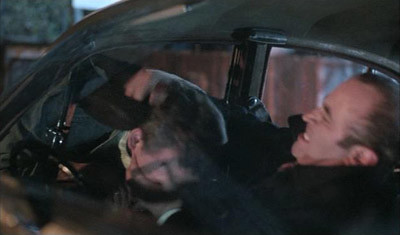
Mona Lisa is the strangest of films: a study of "the vast gulf of misunderstanding between men and women," wrapped in a fairy tale, wrapped in a Pygmalion story, wrapped in a British gangster movie. Oh, and tied up with a bow stolen from Taxi Driver:
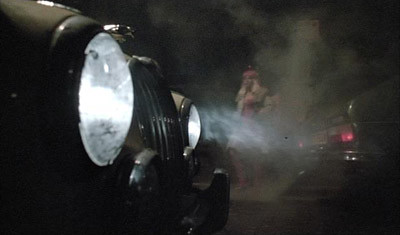
Nothing about that combination should work, but it does, and wonderfully. It's the actors that put it over, mostly because they're so perfectly cast. The main character is the kind of part Bob Hoskins tears to shreds: a Little Englander named George who has just been released from prison. Hoskins can tell you so much about his character through the smallest gestures: look how much exposition he spares us with the expression on his face upon seeing blacks in his old neighborhood:
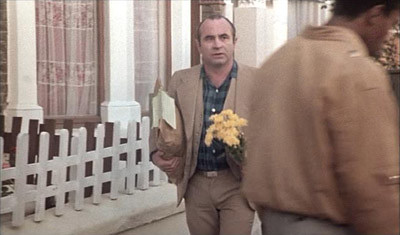
His ex-wife won't see him, his daughter doesn't know him, the criminals he did time for have abandoned him, and his neighborhood has collapsed. The one person who's glad to see him is his friend Thomas, played by Robbie Coltrane.
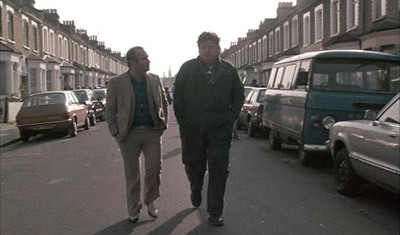
And here's where things start to go off into fairy tale land. Coltrane looks like a Hobbit to begin with, but Jordan has him live in the closest thing British gangster films have to an enchanted cave: a broken-down RV marooned inside of a garage.
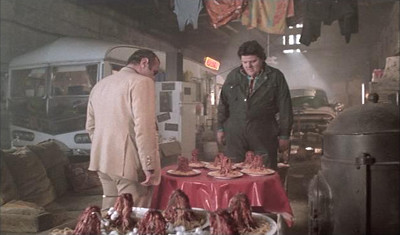
If the look of the garage (or Coltrane, for that matter) didn't tip you off that this is a strange, magical kind of a place, perhaps the artificial plates of spaghetti are a clue:
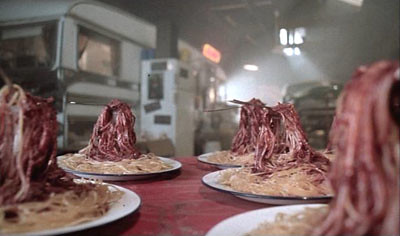
It all seems a little on the nose laid out like that, but the great thing about Mona Lisa is that it's hard to think of it as anything but a straightforward British gangster film while watching it. How much British gangster credibility does it have? This much:
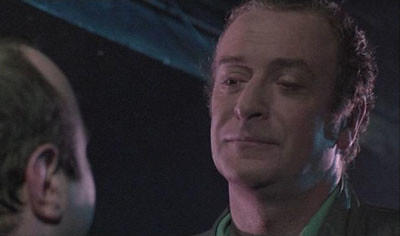
I love The Long Good Friday, but Michael Caine's Mortwell trumps Eddie Constantine any day of the week. Although George has been out of the picture too long to be of much use to his old crew, Mortwell throws him a bone: a job driving a high-end call girl named Simone from one assignation to another. Cathy Tyson plays Simone as the perfect embodiment of unattainable glamour and mystery.
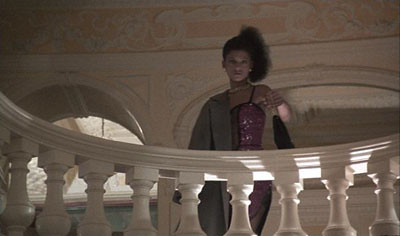
Cathy's inner life is completely unimaginable to George, and he can't help but fill in the blanks. As in The Crying Game, the gulf between George and Simone has as much to do with class as gender: Simone may be "a tall, thin, black tart," as George puts it, but she moves in circles where George never fit in. He doesn't even know how much he doesn't know. On ordering tea from a hotel lobby bar, the waiter asks him, "Earl Grey or lapsang souchong?" "No, tea," George growls, unsure whether he's being made fun of. When Simone gives him money to buy better clothes, he shows up looking like this:
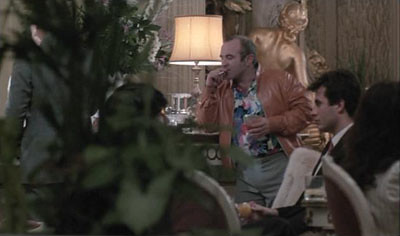
This leads to some of the film's funniest scenes, as Simone remakes George in a sort of reverse-Pretty-Woman sequence.
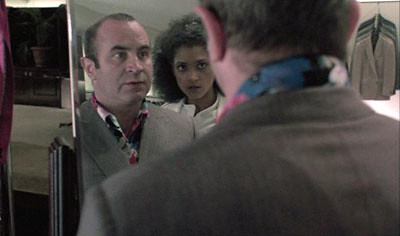
And that's where the troubles begin. People always forget that Henry Higgins took Eliza Dolittle under his wing to win a bet; Pygmalion sold a whole lot of statues before he fell for one of them. But really, how could George do anything but fall in love with the woman who makes him feel like he's as good as anyone else?
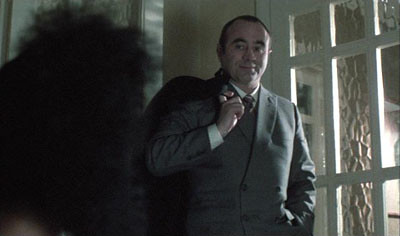
Simone isn't as innocent as a 16th-century sheet of poplar, of course. She's complicit in George's fantasies about her, because she wants more from George than the minimal social graces she'd require from a driver. She's desperately trying to find a prostitute named Cathy she knew when she was working a considerably more downscale beat, before life on the streets kills her. Night after night she has George drive her around neighborhoods as hallucinogenic as anything in Taxi Driver.
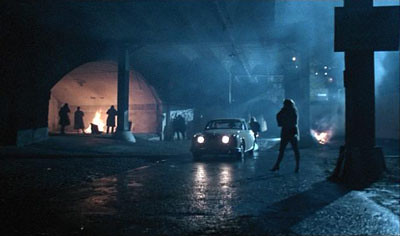
When Scorsese lights the streets that dramatically, it's because we're seeing them through the eyes of a man who imagines his alienation to be romantic, but whatever pale fire lights this shot in Mona Lisa is stolen from Simone. This becomes abundantly clear when George goes looking on his own, through a series of steadily more depressing clip joints. The sequence is horrifying enough that producer Denis O'Brien only allowed it in the film on the condition that it was a montage (set to "In Too Deep," by Phil Collins, which I'm sure the clubs' patrons would agree is an epic meditation on intangibility). The lighting is never flattering.
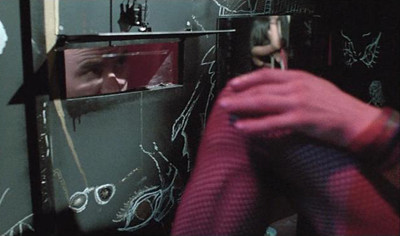
Things reach their inevitable nadir when George, believing he's finally found Cathy, is ushered into a sad little bedroom where a fifteen-year-old girl (Sammi Davis) sets aside her teddy bear and insists that she "make him happy."
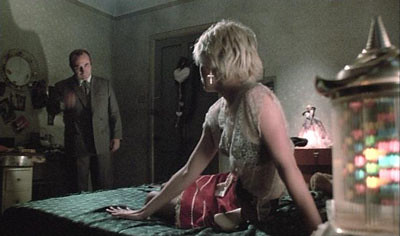
She reminded me of Nabokov's sallow girl with her bald doll, a travesty of familial feeling. She's not really Cathy, it's not really her bedroom, and George can't save her. He does eventually find the woman Simone is looking for, in a church, of all places. And then things start getting really nasty.
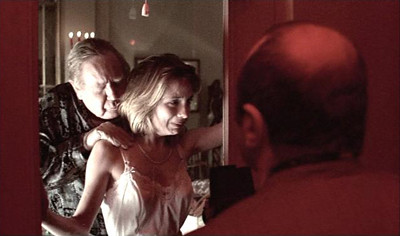
Nearly every scene is filled with the detritus of fairy tales gone sour: pink frills, ice cream, "Michael Finnegan." George steals Cathy away from her rapist by vanishing her through a one-way mirror that opens like a door. When Simone tells George the story of her escape from low-end prostitution, it feels like the details she elides could involve wicked stepmothers, princes in disguise: "I met a man with a gold ring who took me to Brighton. When I woke up, he was gone." The whole thing sounds absurd on the page, and yet it feels so grounded in a particular time and place I never questioned the reality of the characters and their situation. Neil Jordan slips up only once, in my estimation, by staging Cathy and Simone's reunion at a roadside restaurant that makes the fairy tale aspects of the story too explicit. You might say he clobbers the audience over the head with a gigantic shoe.
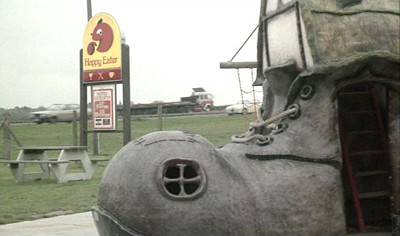
It's the only misstep in a film that otherwise blends fairy tale archetypes and the seedy particulars of London crime with absolute virtuosity. I can't imagine any other director mixing the ridiculous and sublime as boldly as Jordan does when he has Bob Hoskins, at his moment of greatest fury and hostility, wear novelty sunglasses.
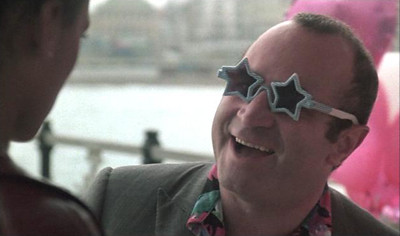
A little context is necessary: Hoskins is playing at being on vacation at the beach. It's thematically linked with all the other points in the film where characters do a bad job of pretending to have a good time. So it's brave, but it isn't entirely crazy. But have that same scene collapse in on itself and show us Simone and George at their rawest and most vulnerable, while still wearing those goddamned glasses: that's brilliant.
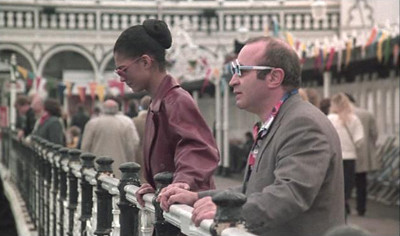
"You ever need someone?" Simone asks, and what she means, in this film about misunderstandings, is "Do you understand me?" George swallows, and looks at her, and the pause before he answers and the way Hoskins makes his voice crack when he finally speaks broke my heart. George says what he says, and you can tell it's as honest as this sad, lonely man has ever been with himself, and then he walks a little distance away to lean against the boardwalk's awning. He can't stand to be close to her at that moment, but he's near enough that she could follow. We know he hopes she does. "You ever need someone?" she asks him. "All the time."
Randoms
- Simone's vicious ex-pimp is played by none other than Clarke Peters, who went on to play Lester Freamon on The Wire. He's considerably less avuncular here.
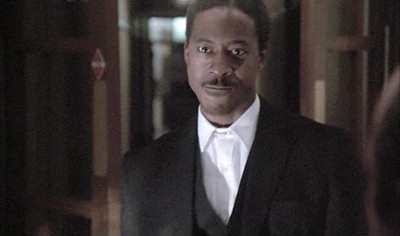
- Peters is also quite an athlete; he makes a flying leap over the corner of a pool table that I'm sure would end with a broken nose were I to attempt it.
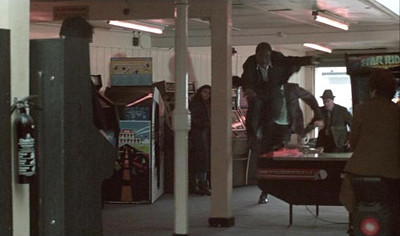
- Mona Lisa was produced by HandMade Films, a collaboration between Denis O'Brien and George Harrison (they also made Monty Python's Life of Brian). I already mentioned that O'Brien was responsible for the Phil Collins montage, but Harrison contributed as well. According to Neil Jordan, his one stipulation was, "I just don't want to see any naked dicks in this movie." There are no naked dicks in Mona Lisa.
- This is the first non-anamorphic widescreen DVD in the collection in a long time; it's overdue for a new transfer. Although if any movie is going to benefit from looking grainy, it's a gangster movie set in and around strip clubs.
- Bob Hoskins tells an amazing story about Michael Caine on the commentary track that's too great not to reproduce in its entirety:
I met Michael in Mexico. I was doing a film in Mexico with him. [Presumably Beyond the Limit] The first time I ever met Michael, he got ahold of me, he said, "''Ere. C'mere. I wanna talk to you." He says, "You've got a lot of talent and you're gonna earn a lot of money. And there's fings you do with your money and there's fings you don't do with your money, and the first fing you don't do with your money is buy a fucking boat, right?" Every time I see him: "I ain't bought a boat, Michael, I promise you." "Buy a house. That's better."
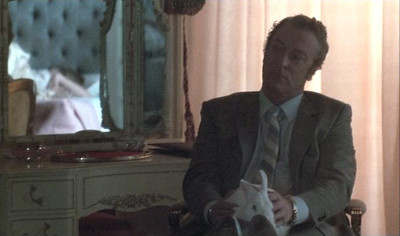
This is quite possibly my favorite movie and I've nothing to say, except that your review is excellent. You really chart the fantastical elements of the story in a way that I didn't consider. One could make a compelling argument linking this to some of Jordan's other films and his repeated interest in pretending/illusion, like The Crying Game.
ReplyDeleteI wish Cathy Tyson did more, she's lovely! I was lucky enough to meet Clarke Peters at a party in New Orleans last year - I mentioned loving Mona Lisa and he gave me a high five and said, "WOW." Plenty avuncular in real life!
The glowing cross in the center of the shot of the young prostitute in bed is ham-fisted but sublime.
ReplyDeleteThis isn't really my favorite movie or one I even like all that much, can't stand Jordan for the most part, but there's one aspect that fascinates me entirely. Jordan has this amazing tendency to focus in on the POV of a character to the point where any opinion of or from the film is that character's. That sort of thing can absolutely ruin a movie like with The Brave One, but here I think it makes it better. The camera is Hoskins in absolute for better or worse. Where this gets really interesting is with the subplot of the wife and daughter which is creepy and gross for the most part, but the film romanticizes it because Hoskins does. Jordan doesn't exist in his films the way most directors or writers do, it's entirely the character.
ReplyDeleteYou mentioned how perfect the casting in this movie is, but that's a point that could be emphasized more strongly- Hoskins is _amazing_, a sort of Archie Bunker character (or I guess, since this is English, an Alf Garnett character) who is nonetheless entirely convincing when he beats people down- the rage that comes out of him is terrifying.
ReplyDeleteIt's interesting to think of this movie as part of the tradition of Saturday Night... and Sunday Morning kitchen sink melodramas as well as gangster movies and fairy tales- Hoskins' character's alienation, class frustration, and pain all seem like the come directly out of something black and white and very sad.
If I had an objection, though- Mortwell? Seriously? That's a JK Rowling level eye-rollworthy character name right there.
Also, I wonder if Harrison's "no naked dicks" was a response to to the absurdly gratuitous full frontal part of Life of Brian
ReplyDeleteLe Ted,
ReplyDeleteThat's awesome that you met Clarke Peters. & yeah, this is pretty much a dry run for The Crying Game in a lot of ways, I think.
Jack,
ReplyDeleteAnd yet, less ham fisted than the glowing plastic madonna statues in Thomas's garage!
Legato,
ReplyDeleteI appreciate the discipline it takes to write a movie where everything is from a single character's perspective. The wife/daughter subplot is plenty creepy in the days of amber alerts but I wonder if it came across that way in 1986? Definitely a good call on Jordan's part to have the daughter be so self-possessed (more than Cathy or any of the other prostitutes).
Tom,
ReplyDeleteYou're on to something with Life of Brian, I bet--if Harrison didn't like swinging dicks in movies he must have hated that scene. And you're completely right re: kitchen sink melodramas and I may revise a sentence or two to include that observation.
Re: Mortwell, it's a fair point, but I do think that character has to have an evil-wizard-like name. Just not so on the nose.
Wonderful review/essay, as usual.
ReplyDeleteMinor grouse: I'd like to call for a voluntary general moratorium on the phrase "on the nose." Something happened in the last year or two so that I'm now seeing those words in something like half the reviews I read. There must be other ways of describing a lack of subtlety.
Now this, this must have been a difficult film to review.
ReplyDeleteMajor props, it's very well thought-out.
By the way, I just noticed the next spine number in the collection is, uh-oh, The Rock...
I'd recommend skipping on ahead to The Scarlet Empress and M-Hulot's Holiday but I guess that would be betraying the very same principles your blog is founded on. So best of luck with that one, man!
I still remember seeing this in the cinema, and actually starting to cry when Hoskins's voice broke at that line. I even teared up reading it again, just now.
ReplyDeleteThanks for this post. I have yet to see "Mona Lisa" but its now on my Netflix queue.
ReplyDeleteAlso wanted to affirm your great work, been following your posts for a for a few years now.
Cheers
Hi, Matthew!
ReplyDeleteI've been following your blog since I discovered it trough the Ebert's entry on The Passion of Joan of Arc. I'm a lazy commenter (and English isn't my first language), but now I decided to pay this little tribute.
I studied cinematography on my own for some time and I really wanted to make a blog or site to express my devotion towards the classics of cinema(mainly), literature and music, in special to bring these classics (some of them little known) to the Brazilian public. My problem was not knowing the right approach to do it. I didn't want to be another critic, I wanted to be didactic, to help another people in how to perceive and understand movies, or books, or albums.
Then, the Criterion Contraption showed the way. Although the Criterion Collection is not available in non-English subtitles, I saw many of its titles and, in addition, I read a lot about them. This brought me to your page and after reading it I thought: this is it! This is what I want to do!
This is why I came here to thank you. Your entries are easy to follow and quite instructive. Your method of displaying the director's choices in a determined scene through its still frames is the closest I've ever seen of learning about direction without going to a course. For instance, your review about La passion de Jeanne d'Arc contains one of the most insightful descriptions I found so far around the internet.
And this is what I'm trying to make (in the cinematic section of my blog), using objective examples to be more didactic and less, lets say, personal. My blog still have a long road in front of it, but at least now it has one road to trail.
So... many thanks and note that I'm waiting anxiously for your next reviews on Playtime, Rififi, Ordet, Notorious, Rashomon, Wild Strawberries, 8 1/2 and Children of Paradise (the best Criterion’s sequence of titles, in my opinion).
Best wishes,
Christian.
Hob,
ReplyDelete"On the nose" is common (and useful) when talking about screenplays; I think it's bleeding into regular discourse from there; that's certainly where I picked it up. It's apt and easy to use when revising a script (and any time spent searching for a clever way to describe what's wrong with a scene is time I'd rather spend fixing the scen itself). But you're right, in criticsm it's in the gray area between living and dead metaphors Orwell warns about. I'll try to avoid it.
Benjamin,
ReplyDeleteThe way to write about The Rock, it turned out, was to not spend too much time on Bay's place in the culture and look at how he does what he does. And now on to The Scarlett Empress, which I love.
Biscuit,
ReplyDeleteI envy you seeing this on film; the Criterion DVD is a pretty muddy transfer. And yeah, that line's a heartbreaker.
I-dream-lo-tech,
ReplyDeleteThanks! I don't think Mona Lisa will disappoint you.
Christian,
ReplyDeleteThanks so much for such a flattering comment, which somehow got caught in Blogger's spam filter. I paged around your very impressive site the first time you linked to mine, and although I don't read Portuguese, I think it's really impressive visually (and obviously I'm all for being didactic...). I'm really glad to hear that my site helped you figure out how you wanted to approach writing about film. I've added you to the blog roll.
Thank you for the link and the commentary about the visual aspect of my site. I have the Criterion Contraption on my links and link's guide as well.
ReplyDeleteHere, I do not actually consider this will have success.
ReplyDeletehow to sell home | secretary sex video | star tattoos
The one person edpilldgb.com who's glad to see him is his friend Thomas, played by Robbie Coltrane.
ReplyDelete